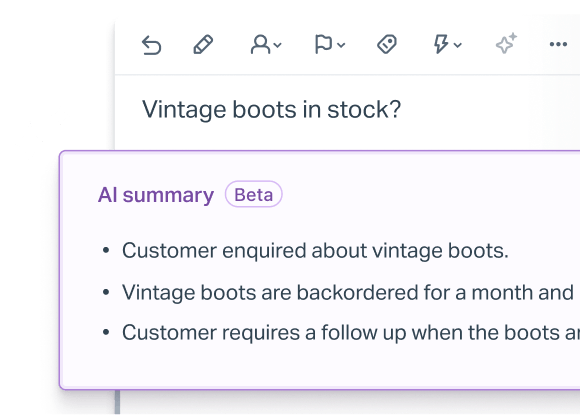None of us can predict exactly what customer service teams will look like in a few years, but there’s no question that teams are feeling the pressure to implement and adapt to AI.
AI-powered customer service tools can transform many facets of the customer experience, from automating routine tasks to improving the efficiency of your team to providing deeper insights into customer behavior and preferences.
The challenges that many teams are facing today are around seamlessly combining this quickly-changing technology with an existing customer service team. AI has the potential to augment your existing team in a massive way — but how do you navigate this new territory?
Given this, it’s crystal clear that the demand for AI skills within service teams is growing rapidly. Companies everywhere need professionals who know how to implement AI solutions, how to train and improve AI, and how to leverage AI to make support teams more effective at what they do.
Primary use cases for AI in customer service
Although there are many different buzzwords used today, AI software in customer support is settling into three primary categories:
AI-powered chatbots.
Agent assist tools.
AI-powered customer feedback and insights tools.
Each of these categories solves different problems for businesses and support teams, and they therefore require different skill sets to deliver the maximum benefits.
AI-powered chatbots
AI-powered chatbots are one of the most common and visible applications of AI in customer service.
These tools are designed to interact with customers in real time, providing immediate responses to queries.
Rule-based chatbots have been part of the support tech stack for a long time. Still, they were often limited in what they could do, and many customers had terrible experiences, because they were often implemented to deflect tickets — whether or not they actually resolved customer issues.
Today’s generative AI chatbots use natural language processing (NLP) and machine learning algorithms to understand and respond to customer inquiries in a conversational manner, making them capable of providing a much better customer experience.
They can handle a massive volume of interactions simultaneously, so they’re very effective at reducing response times and successfully resolving repetitive and straightforward issues.
When implemented right, they can improve customer satisfaction while freeing human agents to handle more complex issues requiring a personal touch.
And that’s the crux: It takes a fair amount of skill to implement them right.
Copilots or AI agent assist tools
Copilots or AI agent assist tools are designed to support agents in real time. They aren’t customer-facing and they aren’t designed to deflect conversations — they’re focused on making support agents better at their jobs.
These often provide relevant information, suggested responses, or next-best-action recommendations during customer interactions. They also help agents become more efficient by rewriting or changing the tone of responses. For instance, Help Scout’s AI features include:
AI Summarize: Condense long email threads into a few bullet points with one click, saving your team from spending time digging through long emails to find context.
AI Drafts: Draft a reply to any email in just one click. This AI uses information from past conversations and help articles to generate email replies that are ready to review, edit, and send.
AI Assist: This feature can translate replies, adjust their tone, simplify their wording, and more — all of which save your team time and enable them to have better customer conversations.
Using an AI Assist tool itself doesn’t require drastically different customer service skills, but the agents who become highly proficient in them will likely be significantly faster, have more accurate responses, and deliver a higher level of customer satisfaction.
In short, they’ll be the agents that set the bar for performance expectations across the team.
AI-powered customer feedback analysis
The final major use case is customer feedback analysis.
These tools use AI to automatically categorize, analyze, and interpret customer feedback from sources like customer conversations, surveys, review sites, and social media. They can identify customer sentiment, uncover insights, and find patterns and trends to enable data-driven decision-making.
Working with a tool for customer feedback used to be expensive, and it was often only an option for enterprise-sized businesses. Generative AI has made them more accessible, and the main challenge CX teams face now is taking those insights, assessing how accurate the data is, and transforming them into actionable recommendations.
Emerging roles and evolving skills in customer support
AI will transform support teams in two major ways:
The emergence of new roles, specifically for implementing and managing AI solutions. Some existing roles (like Knowledge Manager or Support Operations Manager) will also look quite different in the future.
The development of new or enhanced skills, specifically for frontline agents. As AI solutions handle a larger number of customer conversations, frontline roles will increase in complexity and the tickets that make it to human agents will require a deep technical understanding or a higher level of empathy and personalization.
Emerging AI roles in customer service and experience
While the exact responsibilities and titles of these roles will look different from company to company, as AI becomes table stakes in customer service, roles like the ones below will become fixtures across industries:
AI prompt engineers or AI specialists for developing and fine-tuning AI solutions. This role can require varying levels of technical expertise, depending on the nature of the AI tool. Some companies might require data science, proficiency in machine learning, and programming skills. Other companies will focus specifically on prompt engineering and no-code solutions, and the main need will be for skills to train the AI to tailor its responses to that customer.
Knowledge managers, responsible for organizing, managing, and disseminating information. In many companies, this role already exists and is tasked with managing the knowledge base and producing help content. With AI, it will expand to include structuring content for training AI systems and managing more types of content. Knowledge managers will also need to learn skills like using AI tools to speed up and improve content production.
Voice of the customer analysts for gathering and interpreting customer feedback to provide actionable insights. This role will require data visualization and analytical skills to uncover insights and communication and storytelling skills to effectively communicate them across the broader organization. AI tools may actually reduce the technical data science skills required for a role like this today.
Support operations managers to manage workflows, integrate AI tools, and continuously improve support processes. This role has always involved a lot of process optimization, workflow automation, and problem-solving skills, but all of these will become more critical in the age of AI.
Frontline support skills are still needed with AI
Because “easy” customer conversations will frequently be handled by AI, frontline customer service agents of the future will need to sharpen and develop many of the skills they already have. This includes:
Problem-solving. Since AI will take over routine tasks, this will leave agents to deal with more nuanced and challenging cases.
Emotional intelligence. Emotionally charged or sensitive situations will still require a human touch and careful handling.
Technical expertise. Not only will agents need to develop their understanding of how AI tools work since they will impact the customer experience, but they will also handle more technically complex cases, requiring product knowledge and technical skills.
Adaptability. AI is a quickly-evolving technology, so being able to keep up and adapt to change will be vital.
5 ways to develop AI skills
There’s no question that AI skills are in demand.
Almost 70% of leaders say they won’t hire someone without AI skills. They would rather hire a less experienced candidate with AI skills than a more experienced person without them. That makes developing AI skills a major advantage.
Service professionals can develop those skills by:
Building hands-on experience at work. Whether that means using ChatGPT, Gemini, or Claude in your role, volunteering to implement any AI tools, or engaging with the AI features offered within your help desk, nothing is quite as useful as hands-on experience. The more you work with these tools, the better you’ll understand how to tweak them, and the more effective you’ll be at working with them.
Using educational material developed by AI providers. Many providers, like Ultimate and Siena, have created educational material targeted at CX professionals who want to implement these tools. While their content might be best suited for people working with their tools, many of the principles of working with generative AI can be applied in multiple contexts.
Participating in online courses on websites like Coursera, Udemy, edX, or LinkedIn Learning. There are many courses about how to build a chatbot using specific tools or programming languages. Again, going through a few of these will give you a good baseline understanding of how generative AI works across the board, which you can then apply to whatever tool you end up using.
Attending workshops or webinars about AI. These will probably be most useful if they’re coming from within the industry, like Help Scout’s webinar on how to stay customer-first while working with AI. Since AI is a hot topic right now, the quality of each webinar will vary, but anything that includes direct interaction or a Q&A segment from other support professionals will make it easier for you to learn from practical, real-life experience.
Joining communities and discussion forums. Support Driven is a great example of a community for customer support professionals where you can find and engage with people working with AI solutions on a daily basis. These are also a good place to make connections and get recommendations from other people.
Here’s the catch: None of these methods will be very effective unless you consciously dedicate time and effort to them.
For example, a good place to start independently experimenting is by creating your own GPT.
By building out your own GPT, you’ll get experience tweaking prompts to get a sense of how generative AI works. It’ll be very close to the experience of training an AI solution. You can also create a GPT that’s intended to be a “copilot” in your role and use it to experiment with ways to help you work faster or enhance your skills. Doing this also demonstrates initiative and a forward-thinking mindset to potential employers — and you can share GPTs with other people, so it can be a good outlet for some creativity and fun.
You don’t need to wait for your company or team to implement an AI tool to develop your own AI skills.
How AI skills can future-proof a career in customer service
AI skills differentiate candidates in support roles. This is true today, and it will only be more true in the future.
Many customer service leaders are already asking questions about familiarity with AI tools as part of their interview processes. AI is reshaping the industry, so candidates with AI skills will have an edge over the competition.
As a technology, it will only continue to improve over time, so developing these skills now and keeping up with that advancement is a worthwhile investment in your support career.









